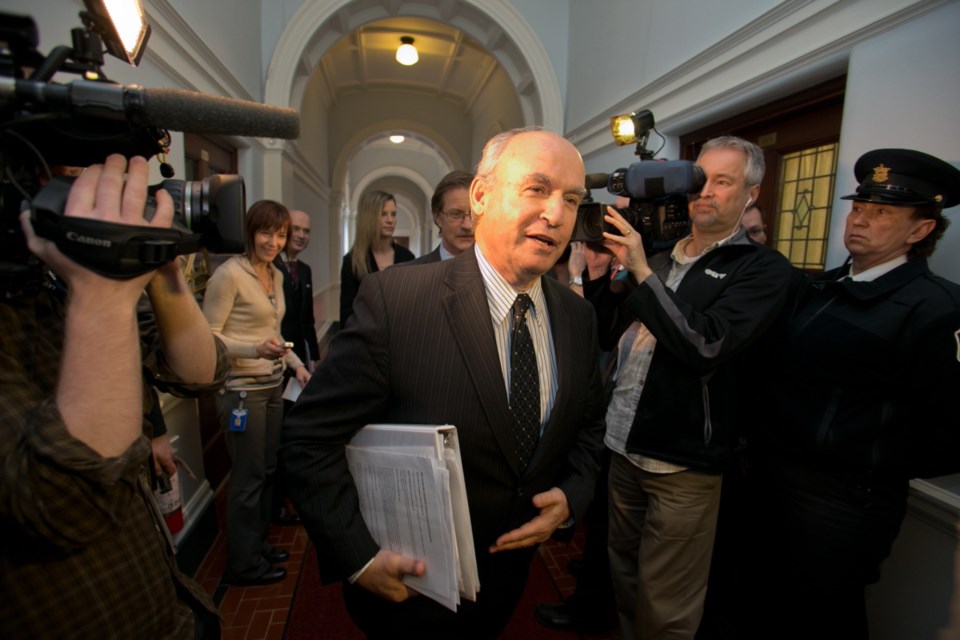Adrian Dix of the B.C. NDP criticized the B.C. government’s 10-year financing plan for B.C. Hydro (“10-year B.C. Hydro plan is a massive miss,” comment, Aug. 11). That brought a response from Energy Minister Bill Bennett (“B.C. Hydro’s 10-year rates plan is on track,” comment, Aug. 17).
Bennett, usually respected for his candour as well as his passion, chose instead to follow the speaking points of the communications staff, rather than honestly describing the financial condition of our electrical utility.
Doing so, however, would have required the minister to say why the government has deliberately suppressed rate increases below the level needed to cover B.C. Hydro’s growing costs. He would have to tell us how, despite expenditures exceeding revenues, the company has claimed record profits and paid a handsome dividend to the government. Sounds like the miracle of loaves and fishes.
The trick lies in deferral accounting. It’s standard practice in the utility world to spread the impact of large, lumpy expenditures over several years so as to avoid rate shocks. We won’t be asked to pay, for example, all the costs of Site C in the year it comes on stream. But these deferral accounts are closely scrutinized by regulators for their propriety and for their overall size. Except in supernatural B.C.
First, alone among B.C. Crown entities, Hydro was exempted by the cabinet from having to follow generally accepted Canadian accounting principles, imposing a U.S. standard instead.
But the U.S. standard requires independent third-party regulatory supervision. This must have been inconvenient, since the cabinet exempted B.C. Hydro from that requirement.
Deferral accounts have been growing since the current government took office, but really took off in the wake of the 2008 financial crisis and in preparation for the 2013 election. The recession of 2008-09 prompted the B.C. Utilities Commission to approve additional short-term deferral accounts to moderate the impact on rates.
By 2012, though, the BCUC was becoming concerned about the size of deferral accounts and the impact of B.C. Hydro’s rapidly rising debt level on future ratepayers. And potentially on taxpayers, since the government guarantees B.C. Hydro’s debt.
Before the utilities commission could hold public hearings, the cabinet pre-empted it with an order to approve a three-year rate plan well below what was required to match B.C. Hydro’s projected costs, coincidentally ensuring that these rates would not be an issue in the 2013 election.
After the election, B.C. Hydro presented the government with a request for a two-year 26 per cent rate hike. Faced with a choice between playing by the rules and paying the bill, the government changed the rules. In November 2013 it announced a 10-year plan to “manage” rate changes. Unsurprisingly, the rate increases for the first five years were way below the forecast requirements.
Here’s where the trick comes in. Rather than have the company’s net income go negative to reflect the straitjacket designed for it, and without reference to the regulator, cabinet changed the rules again, this time instructing B.C. Hydro to record as revenue the difference between the required revenue and that generated by the suppressed rates.
Bingo! Assumed future revenue — essentially an obligation on future ratepayers not approved by BCUC — was to be recorded as cash in the here and now, and a substantial contributor to “profit.”
Is recording hypothetical and unapproved future revenue allowed under generally accepted accounting rules, either Canadian or American? We don’t think so, and our public guardian, the BCUC, has been emasculated. Perhaps the auditor general could provide a definitive opinion.
Bennett suggests the purpose of the rate-smoothing deferral account is to amortize large capital expenditures, but that’s not so. Its purpose is clear in Directive 7, an order-in-council of March 2014: to record in a current fiscal period future unapproved revenue to ensure that the government’s high net-income targets are achieved. Everything is being massaged so that in May 2017, the province’s finances will look good.
But what if real revenues, as opposed to hypothetical ones, fall below forecast? This is what happened in 2014 and 2015 when, as usual, demand didn’t live up to B.C. Hydro’s rosy forecasts.
Well, in for a dime, in for a dollar: An increasingly desperate government last month (Order-in-Council 590/16) required B.C. Hydro to achieve minimum profit levels for the next three years, with deferral accounts picking up the slack. The dividend, as long as it lasts, will continue to be paid with money borrowed by B.C. Hydro.
Bennett says the 10-year financing plan is on track, and the rate-smoothing account total of $1.3 billion for 2021-22 will disappear two years later. Just how this next miracle will happen, especially when 2024 is the year the $8.8-billion cost of Site C is supposed to hit the rate base, he didn’t say.
Richard McCandless’s article, Rate Manipulation and Debt Transformation: The Political Use of B.C. Hydro 2008 to 2014, will be published by B.C. Studies this fall. Harry Swain, a retired federal deputy minister, chaired the joint review panel on Site C.
